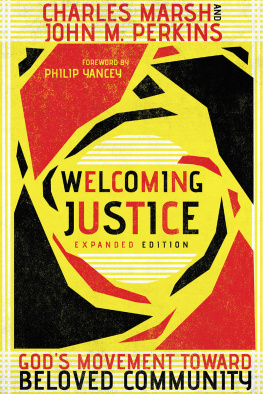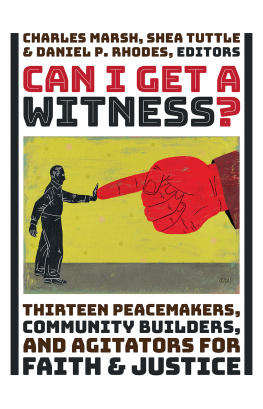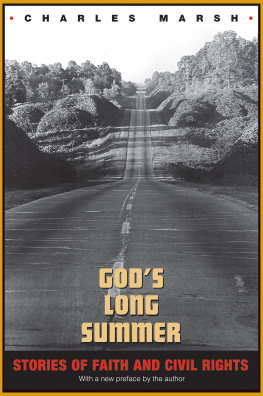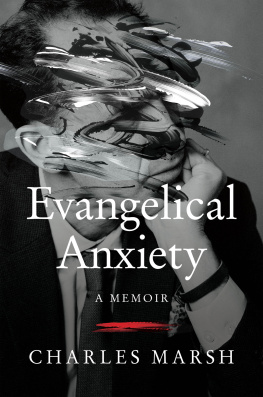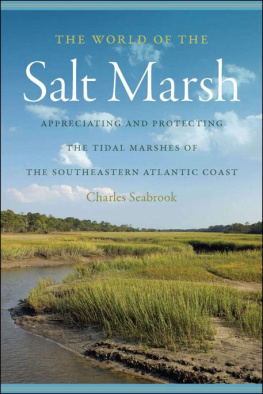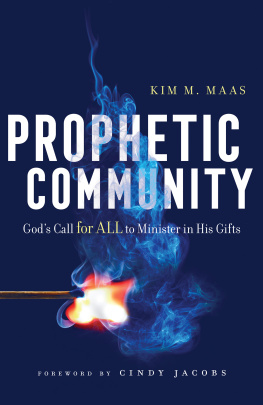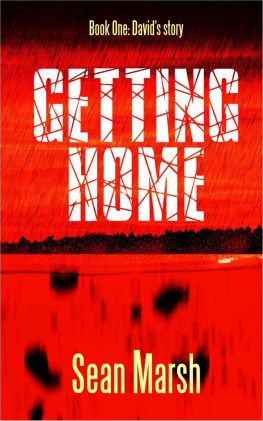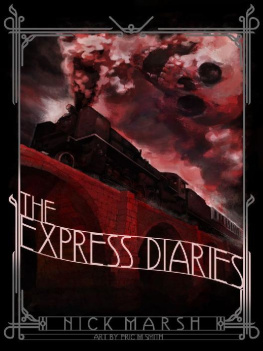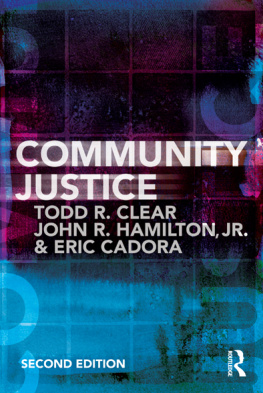Charles Marsh - Welcoming Justice: Gods Movement Toward Beloved Community
Here you can read online Charles Marsh - Welcoming Justice: Gods Movement Toward Beloved Community full text of the book (entire story) in english for free. Download pdf and epub, get meaning, cover and reviews about this ebook. year: 2018, publisher: InterVarsity Press, genre: Politics. Description of the work, (preface) as well as reviews are available. Best literature library LitArk.com created for fans of good reading and offers a wide selection of genres:
Romance novel
Science fiction
Adventure
Detective
Science
History
Home and family
Prose
Art
Politics
Computer
Non-fiction
Religion
Business
Children
Humor
Choose a favorite category and find really read worthwhile books. Enjoy immersion in the world of imagination, feel the emotions of the characters or learn something new for yourself, make an fascinating discovery.
- Book:Welcoming Justice: Gods Movement Toward Beloved Community
- Author:
- Publisher:InterVarsity Press
- Genre:
- Year:2018
- Rating:5 / 5
- Favourites:Add to favourites
- Your mark:
- 100
- 1
- 2
- 3
- 4
- 5
Welcoming Justice: Gods Movement Toward Beloved Community: summary, description and annotation
We offer to read an annotation, description, summary or preface (depends on what the author of the book "Welcoming Justice: Gods Movement Toward Beloved Community" wrote himself). If you haven't found the necessary information about the book — write in the comments, we will try to find it.
Welcoming Justice: Gods Movement Toward Beloved Community — read online for free the complete book (whole text) full work
Below is the text of the book, divided by pages. System saving the place of the last page read, allows you to conveniently read the book "Welcoming Justice: Gods Movement Toward Beloved Community" online for free, without having to search again every time where you left off. Put a bookmark, and you can go to the page where you finished reading at any time.
Font size:
Interval:
Bookmark:
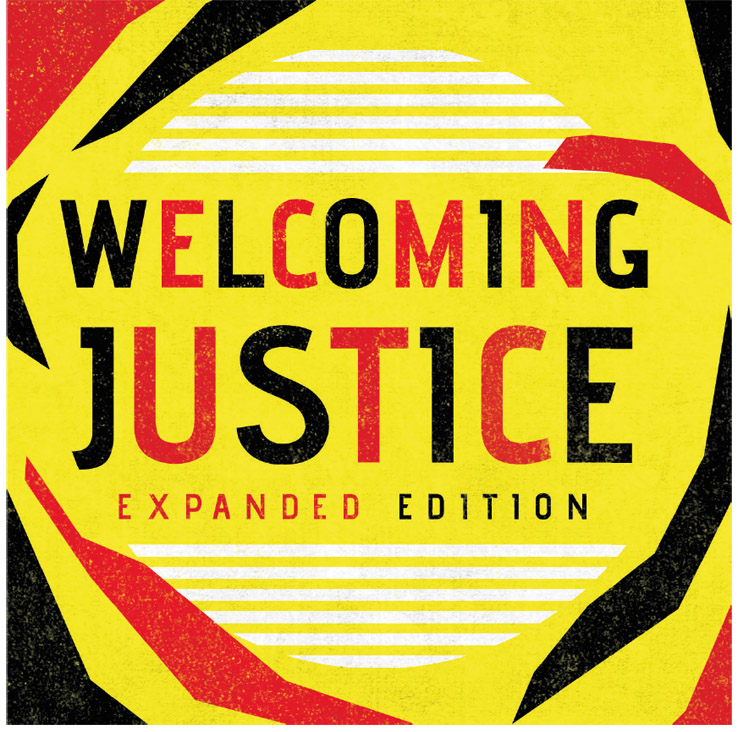
BELOVED COMMUNITY

FOREWORD BY PHILIP YANCEY
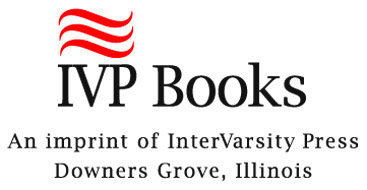
InterVarsity Press
P.O. Box 1400, Downers Grove, IL 60515-1426
ivpress.com
Second edition 2018 by Charles Marsh and John M. Perkins
First edition 2009 by Charles Marsh and John M. Perkins
All rights reserved. No part of this book may be reproduced in any form without written permission from InterVarsity Press.
InterVarsity Pressis the book-publishing division of InterVarsity Christian Fellowship/USA, a movement of students and faculty active on campus at hundreds of universities, colleges, and schools of nursing in the United States of America, and a member movement of the International Fellowship of Evangelical Students. For information about local and regional activities, visit intervarsity.org.
All Scripture quotations, unless otherwise indicated, are taken from the Holy Bible, Todays New International VersionCopyright 2001 by International Bible Society. All rights reserved.
While any stories in this book are true, some names and identifying information may have been changed to protect the privacy of individuals.
Cover design and artwork: David Fassett
Images: grey texture background: altedart / iStock / Getty Images Plus
ISBN 978-0-8308-7390-6 (digital)
ISBN 978-0-8308-3479-2 (print)
This digital document has been produced by Nord Compo.
PHILIP YANCEY

O n November 4, 2008, I boarded a plane for Memphis just before polling places closed in the east. Stepping off the plane three hours later, I turned to the first person I saw, an African American baggage handler. Do you know who won the election? He proceeded to give me a complete breakdown of the Electoral College results and which states Barack Obama would need to clinch victory. I got a strong clue as to how much this election meant to a people who have spent far more years oppressed than liberated by democracy.
The next day I toured the National Civil Rights Museum built around the motel where Martin Luther King Jr. was assassinated. For several hours I revisited the scenes I had known so well as a teenager coming of age in the South. The brave college students in Greensboro, North Carolina, who sat at a lunch counter as goons stamped out cigarettes in their hair, squirted mustard and ketchup in their faces, then knocked them off the stools and kicked them while white policemen looked on, laughing. The eerie scenes of weightless children flying through mist in Birmingham, Alabama, propelled by high-powered fire hoses. The Freedom Ride bus burned in Alabama, the corpses unburied in Mississippi.
Looking back, it seems incredible to imagine such ferocity directed against people who were seeking the basic ingredients of human dignity: the right to vote, to eat in restaurants and stay in motels, to attend college (two hundred National Guardsmen escorted James Meredith to his first class at the University of Mississippi, and even so people died in the ensuing riots).
Outside the museum, words from Kings final I have been to the mountaintop speech are forged in steel, words that caught in my throat on a sunny day mere hours after Obama was elected as our first African American president: I may not get there with you, but I want you to know that we, as a people, will get to the Promised Land. The next day King died in a pool of blood on the very spot where I was standing.
Although many Christians have important policy differences with President Obama, this historical moment offers a golden time for reflection and, yes, repentance over our share in the sin of racism that has marked this nation since its founding. It took Southern Baptists 150 years to apologize for their support of slavery, and not until 2008 did Bob Jones University admit their error in barring black students before 1971. Their words of apologyWe failed to accurately represent the Lord and to fulfill the commandment to love others as ourselvesapply to many of us, for many conservative Christians vigorously opposed the movement. Can we now respond to a leaders call for healing and reconciliation?
* * *
I have much in common with Charles Marsh, a Southern Baptist ministers son growing up in a small southern town in the late sixties who began to question the assumptions of his family and the surrounding racist culture. I have followed with great interest his writings on the topic, such as Gods Long Summer: Stories of Faith and Civil Rights and The Last Days: A Sons Story of Sin and Segregation at the Dawn of a New South.
And John Perkins played a key role in my own enlightenment on racial issues. In 1974, ten years after the landmark Civil Rights Bill, I accepted his invitation to visit the small town of Mendenhall, just south of Jackson. As a black minister, Perkins had lived through the worst nightmares of the Civil Rights movement. I heard the stories of his own encounters with violent sheriffs and the Ku Klux Klan during the week I spent in Mississippi. I slept on a foldout sofa in the living room of his home, which meant I got very little sleep since Perkins went to bed late and rose long before sunrise to read his Bible and pore over newspapers and journals piled on his kitchen table. I doubt I was the first white guest to integrate Perkinss home, though he had been the first black guest in many white homes during his speaking tours across the country. We had much time to talk, and I learned to appreciate Perkinss graciousness in reaching out to the white community from whom he had received such abuse.
Most local ministers of Perkinss evangelical persuasion stuck to preaching the gospel and left human needs to social workers and government agencies. Perkins accepted the broader mission proclaimed by Jesus (Luke 4:18-19):
to preach the gospel to the poor
to heal the brokenhearted
to proclaim liberty to the captives
and recovery of sight to the blind
to set at liberty those who are oppressed
to proclaim the acceptable year of the Lord
After one horrific night of torture in jail, Perkins underwent a crisis of faith. It was time for me to decide if I really did believe what Id so often professed, that only in the love of Christ, not in power of violence, is there any hope for me or the world. I began to see how hate could destroy me. In the end, I had to agree with Dr. King that God wanted us to return good for evil, not evil for evil. Love your enemy, Jesus said. And I determined to do it. Its a profound, mysterious truth, Jesus concept of love overpowering hate. I may not see it in my lifetime. But I know its true. Because on that bed, full of bruises and stitches, God made it true in me. I got a transfusion of hope.
Over the next decades, Perkins moved to Los Angeles, where he founded both a local and national organization for community development based on what he had learned in Mendenhall, then returned to Mississippi to lead a movement for racial reconciliation. John Perkinss son Spencer soon took up the torch, joining with Chris Rice, a young white man, to write and speak on the topic of racial reconciliation. Tragically, Spencer died of heart failure at the age of forty-three.
Font size:
Interval:
Bookmark:
Similar books «Welcoming Justice: Gods Movement Toward Beloved Community»
Look at similar books to Welcoming Justice: Gods Movement Toward Beloved Community. We have selected literature similar in name and meaning in the hope of providing readers with more options to find new, interesting, not yet read works.
Discussion, reviews of the book Welcoming Justice: Gods Movement Toward Beloved Community and just readers' own opinions. Leave your comments, write what you think about the work, its meaning or the main characters. Specify what exactly you liked and what you didn't like, and why you think so.

